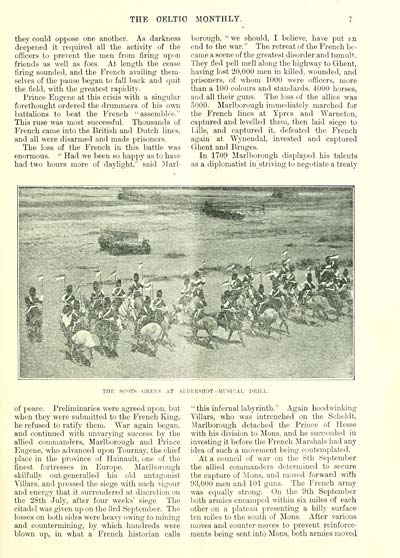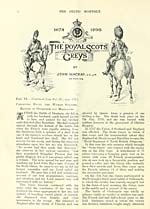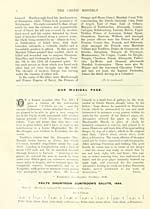Blair Collection > Celtic monthly > Volume 5, 1897
(21)
Download files
Complete book:
Individual page:
Thumbnail gallery: Grid view | List view

THE OELTIO MONTHLY.
they could oppose one another. As darkness
deepened it required all the activity of the
officers to prevent the men from firing upon
friends as well as foes. At length the cease
tiring sounded, and the French availing them^
selves of the pause began to fall back and quit
the field, with the greatest rapidity.
Prince Eugene at this crisis with a singular
forethought ordered the drummers of his own
battaUons to beat the French "assemblee."
This ruse was most successful. Thousands of
French came into the British and Dutch hnes,
and all were disarmed and made prisoners.
The loss of the French in this battle was
enormous. " Had we been so happy as to have
had two hours more of dayhght," said .Marl-
borough, "we should, I believe, have put sn
end to the war." The retreat of the French be-
came a scene of the gi'eatest disorder and tumult.
They fled pell mell along the highway to Ghent,
having lost 20,000 men in killed, wounded, and
prisoners, of whom 1000 were officers, more
than a 100 colours and standards, 4000 horses,
and all their guns. The loss of the allies was
5000. Marlborough immediately marched for
the French lines at Ypres and Warneton,
captured and levelled them, then laid siege to
Lille, and captured it, defeated the French
again at ^Yyuendal, invested and captured
Ghent and Bruges.
In 1709 Marlborough displayed his talents
as a diplomatist in striving to negotiate a treaty
9 f
:i;sIIiJT .ML -1 Al
of peace. Preliminaries were agreed upon, but
when they were submitted to the French King,
he refused to ratify them. War again began,
and continued with unvarying success bj' the
allied commanders, Marlborough and Prince
Eugene, who advanced upon Tournay, the chief
place in the province of Hainault, one of the
finest fortresses in Europe. Marlborough
skilfully out-generalled his old antagonist
Villars, and pressed the siege with such vigour
and energy that it surrendered at discretion on
the 2Sth July, after four weeks' siege. The
citadel was given up on the 3rd September. The
losses on both sides were heavy owing to mining
and countermining, by which hundreds were
blown up, in what a French historian calls
"this infernal labyrinth." Again hoodwinking
Villars, who was intrenched on the Scheldt,
Marlborough detached the Prince of Hesse
with his division to Mons, and he succeeded in
investing it before the French Marshals had any
idea of such a movement being contemplated.
At a council of war on the 8th September
the allied commanders determined to secure
the capture of Mons, and moved forward with
93,000 men and 101 guns. The French army
was equally strong. On the 9th September
both armies encamped within six miles of each
other on a plateau presenting a hilly surface
ten miles to the south of Mons. After various
moves and counter-moves to prevent reinforce-
ments being sent into Mons, both armies moved
they could oppose one another. As darkness
deepened it required all the activity of the
officers to prevent the men from firing upon
friends as well as foes. At length the cease
tiring sounded, and the French availing them^
selves of the pause began to fall back and quit
the field, with the greatest rapidity.
Prince Eugene at this crisis with a singular
forethought ordered the drummers of his own
battaUons to beat the French "assemblee."
This ruse was most successful. Thousands of
French came into the British and Dutch hnes,
and all were disarmed and made prisoners.
The loss of the French in this battle was
enormous. " Had we been so happy as to have
had two hours more of dayhght," said .Marl-
borough, "we should, I believe, have put sn
end to the war." The retreat of the French be-
came a scene of the gi'eatest disorder and tumult.
They fled pell mell along the highway to Ghent,
having lost 20,000 men in killed, wounded, and
prisoners, of whom 1000 were officers, more
than a 100 colours and standards, 4000 horses,
and all their guns. The loss of the allies was
5000. Marlborough immediately marched for
the French lines at Ypres and Warneton,
captured and levelled them, then laid siege to
Lille, and captured it, defeated the French
again at ^Yyuendal, invested and captured
Ghent and Bruges.
In 1709 Marlborough displayed his talents
as a diplomatist in striving to negotiate a treaty
9 f
:i;sIIiJT .ML -1 Al
of peace. Preliminaries were agreed upon, but
when they were submitted to the French King,
he refused to ratify them. War again began,
and continued with unvarying success bj' the
allied commanders, Marlborough and Prince
Eugene, who advanced upon Tournay, the chief
place in the province of Hainault, one of the
finest fortresses in Europe. Marlborough
skilfully out-generalled his old antagonist
Villars, and pressed the siege with such vigour
and energy that it surrendered at discretion on
the 2Sth July, after four weeks' siege. The
citadel was given up on the 3rd September. The
losses on both sides were heavy owing to mining
and countermining, by which hundreds were
blown up, in what a French historian calls
"this infernal labyrinth." Again hoodwinking
Villars, who was intrenched on the Scheldt,
Marlborough detached the Prince of Hesse
with his division to Mons, and he succeeded in
investing it before the French Marshals had any
idea of such a movement being contemplated.
At a council of war on the 8th September
the allied commanders determined to secure
the capture of Mons, and moved forward with
93,000 men and 101 guns. The French army
was equally strong. On the 9th September
both armies encamped within six miles of each
other on a plateau presenting a hilly surface
ten miles to the south of Mons. After various
moves and counter-moves to prevent reinforce-
ments being sent into Mons, both armies moved
Set display mode to: Large image | Transcription
Images and transcriptions on this page, including medium image downloads, may be used under the Creative Commons Attribution 4.0 International Licence unless otherwise stated. ![]()
| Early Gaelic Book Collections > Blair Collection > Celtic monthly > Volume 5, 1897 > (21) |
|---|
| Permanent URL | https://digital.nls.uk/75851225 |
|---|
| Shelfmark | Blair.57 |
|---|---|
| Additional NLS resources: | |
| Attribution and copyright: |
|
| Description | A selection of books from a collection of more than 500 titles, mostly on religious and literary topics. Also includes some material dealing with other Celtic languages and societies. Collection created towards the end of the 19th century by Lady Evelyn Stewart Murray. |
|---|
| Description | Selected items from five 'Special and Named Printed Collections'. Includes books in Gaelic and other Celtic languages, works about the Gaels, their languages, literature, culture and history. |
|---|

